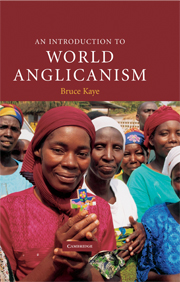12 - Knowledge and authority in the conversation
Published online by Cambridge University Press: 05 June 2012
Summary
Anglicanism is riddled with reasoning activity. Anglicans are people who have traditionally reflected upon their faith and sought to understand it in their own particular circumstances. That is partly what causes them so much trouble in understanding each other across deep cultural and linguistic divisions. But the continuing reality of world Anglicanism is that there is a persistent sense of the faith as something that is reasonable: not in the sense that any reasonable person in any context would on reflection see that Anglicanism is persuasive; rather in the sense that it is capable of reasoned reflection and endeavour, which takes place in all sorts of contexts and situations and with varying styles and competences.
Theology as reasoning about the faith is pervasive and intensive in Anglicanism because it serves the vital task of nurturing an understanding faith in the church. It is that activity which enables Anglicans' love to overflow more and more with knowledge and wisdom and full insight. It is also forced upon the church because of its commitment to the historical distance of the life, death and resurrection of Jesus, whom the church continues to worship now in the present. These are also the elements which shape the kind of authority that works in Anglican faith and theology.
HOW THE CONVERSATION TAKES PLACE
The range of styles and types of theology done by Anglicans is apparent simply by identifying who is doing it and where.
- Type
- Chapter
- Information
- An Introduction to World Anglicanism , pp. 199 - 209Publisher: Cambridge University PressPrint publication year: 2005

